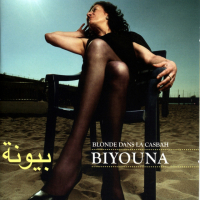Biyouna
 DZAMiddle Eastern, Arabic Folk
DZAMiddle Eastern, Arabic Folk

 DZAMiddle Eastern, Arabic Folk
DZAMiddle Eastern, Arabic FolkAlgeria-born, skilled Middle Eastern musician Biyouna specializes in the Arabic Folk music subgenre. Her songs are distinguished by their emotional lyrics, rhythmic beats, and evocative melodies that frequently address themes of love, loss, and longing. Biyouna has garnered praise from critics and a devoted following both in Algeria and abroad because to her dramatic stage presence and powerful voice.
Biyouna draws on the rich history of North African music to create a sound that is both familiar and fresh. Her music has a special fusion of Arabic, Berber, and Andalusian influences. Her music frequently combines delicate guitar work with traditional percussion, eerie vocals, and rhythms and noises from the sea and the desert. Biyouna is a captivating and charming singer whose music has captivated audiences all around the world, whether she's playing solo or with a full band.
The Middle Eastern music landscape has been enthralled by the well-known Algerian singer Biyouna thanks to her varied and passionate compositions. One of her best songs, "Taali," features her distinctive vocals and ancient Algerian instruments to produce a nostalgic and real tone. In contrast, "Bergman (feat. Biyouna)" showcases her musical range and capacity to cut across cultural barriers by fusing French and Arabic music. Biyouna frequently expresses her political and personal beliefs in her music, like in "Les gens ne m'aiment pas," a song about society's tendency to pass judgment.
"Une blonde platine dans la Casbah," another standout single, has a lively melody and lyrics that question gender norms and preconceptions. Among Biyouna's other well-known songs, "El Barah," "Echemaa," "La Man," "Demain tu te maries," "El Ghafel," and "Maoudlik" demonstrate her command of a variety of musical genres and capacity to engage her audience.
Overall, Biyouna's music is an example of the Middle Eastern and Algerian cultures' vast and varied cultural history. Through her music, she has established herself as a representation of authenticity and power, motivating followers all around the world to embrace their heritage and express themselves creatively.
"Blonde dans la Casbah," the most recent album by Algerian music legend Biyouna, was released in 2006. The album combines traditional Arabic folk music with upbeat, contemporary sounds. Fans of Middle Eastern music must listen to this album because of Biyouna's engaging vocals and beautiful melodies that come through in every track.
"Blonde dans la Casbah," the album's opening track, combines traditional Arabic instruments with electronic sounds. Setting the tone for the rest of the album, the song displays Biyouna's distinctive style and her talent for fusing traditional music with modern elements. Other noteworthy songs on the album include "El Bareh," which has a catchy chorus and a fast tempo, and "Nhabek Ya Salem," a touching ballad with lovely music.
Anyone who enjoys Middle Eastern music must own Biyouna's "Blonde dans la Casbah" album. The CD demonstrates Biyouna's skill as a vocalist and songwriter as well as her aptitude for fusing contemporary sounds and captivating melodies with traditional Arabic folk music. This album is likely to please, whether you've been a fan of Biyouna's music for a while or are just discovering it.
The Algerian Middle Eastern and Arabic folk musician Biyouna has worked with a number of other musicians over the course of her career. Her most well-known duets with other artists are "Bergman" and "Les gens ne m'aiment pas" with French singer Julien Dore, "La man" with French singer Christophe, "El Ghafel" with Algerian singer Djamel Laroussi, and "Merci pour tout - C'que j'n'ai pas" with French musician Didier Wampas.
The songs "Bergman" and "Les gens ne m'aiment pas," which Biyouna co-wrote with Julien Dore, are among her most renowned collaborations. The haunting melody of "Bergman" is a stunning ballad, and Biyouna's strong vocals harmonize well with Dore's deep voice. The lively song "Les gens ne m'aiment pas" shows off Biyouna's range as a musician with a catchy chorus and enduring groove.
Biyouna and Christophe's work together on the song "La man" is another noteworthy project. The melancholy rhythm of this slow-burning ballad draws attention to Biyouna's expressive vocals. "La man" is one of Biyouna's best songs and has eerie lyrics and atmospheric accompaniment that create a somber and introspective vibe.
In conclusion, although Biyouna has worked with many outstanding artists throughout the course of her career, her relationships with Julien Dore and Christophe stand out as some of the most meaningful and enduring. These partnerships highlight Biyouna's versatility as a musician and her capacity to collaborate with musicians from various genres and backgrounds to produce stunning and enduring music.